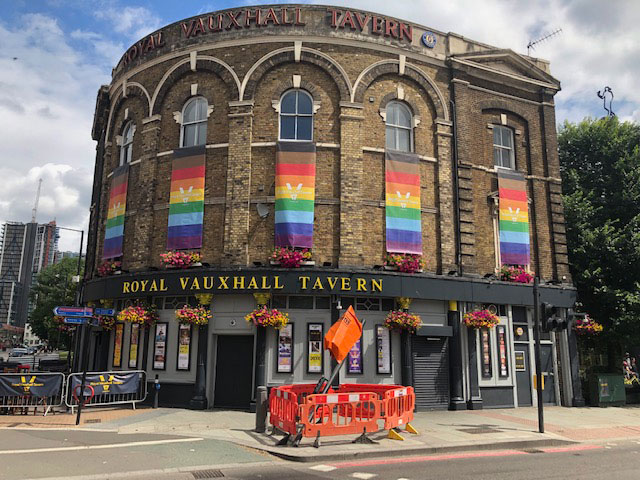Post
ARCHIVE | Queer Vision: the campaign to save the Royal Vauxhall Tavern
20 Apr 2020
From Journal 471 (spring summer 2017)
The recent campaign to save legendary LGBTQ institution the Royal Vauxhall Tavern has shown that when calculating value, culture and community count, says Anna Sullivan
The value of heritage is normally described in terms of significance, the value of property quite differently, though the value of both is related to scarcity. In a crowded city where development opportunities are comparatively scarce but the potential profits high, the least-difficult approach is to consider land value alone, but this narrow approach ignores other assets that a place can possess – not least community value.
The night-time economy of London has long been a draw with its great variety of pubs and clubs that in themselves have become institutions: the Astoria, Madame Jojo's, Ronnie Scott's, and the Royal Vauxhall Tavern... the first two are now closed and the RVT, sold to property developers in 2014, is still in peril despite a series of successes to keep it open.
The route to preservation of the RVT began with its recognition in 2014 as an Asset of Community Value, this was followed by Grade II listing, a landmark for LGBTQ rights, and in January Lambeth Council bestowed a sui generis use class on it as a cabaret and entertainment venue. A campaign group of regulars, RVT Future, has contributed greatly to this progress, alongside the efforts of the RVT’s Chief Executive, James Lindsay, the RVT's former owner, who once enjoyed nights out at the venue and took the opportunity to buy it 17 years ago. They have successfully demonstrated the venue has a community value and a cultural value, which are both now enshrined in its heritage value.
Even so, the situation is not as good as it could be; the use class does not prescribe it as an LGBTQ venue, and there is a fear a new owner could turn it into just-another-venue with no particular community connection. Further, though the business does well, it needs to expand to survive. The listing, which can frighten off developers, has proved too daunting to one already and there is a fear it will intimidate others, which still leaves the venue in a perilous state.
Why should listing frighten off developers? Is it because it declares there are other aspects to value than just commercial value? Perhaps it is the increased cost of development since the loss from the industry of traditional skills and materials has made them specialist and therefore more costly. Or perhaps listing makes it more difficult to dismiss considerations such as lineage, history and memory in order to maximise profit, which for a minority is the only measure of a successful project.
Heritage value tends to be seen as an asset when it adds a percentage to the selling price; until then it is often a burden to be overcome. But this is not a pervasive view. At the Heritage Alliance annual debate in December last year (2016), successful developer Trevor Osborne spoke of the value of working with heritage assets for their aesthetic and historical value, and with commercial necessities. He recognises historic buildings are worthy of preservation and that heritage value is a benefit.
However, this assessment of value is at the end of the process; adding value by making a wreck habitable, for example. There is another side to the equation at the beginning of the process, that is the intrinsic value of a place on which development can build and make gains. It is a more sophisticated approach, more rewarding, more holistically sustainable and seeks to work with a community rather than impose something in a high-handed manner. In the case of the Royal Vauxhall Tavern it's not so much the bricks and mortar, the fabric of the building, its significance comes from community value, its association with LGBTQ culture, as an LGBTQ venue with a London- wide draw, and beyond. It is also part of the lives of countless others passing by this piece of London’s historic built environment each day.
It's an interesting question that, as the significance of the RVT is derived from being an LGBTQ venue, would changing the venue to non-LGBTQ require listed building consent? James Lindsay says its sui generis use class is good, but it fails to give the protection needed. His goal is to ensure it remains an LGBTQ venue. There is a crowd-funding campaign currently underway to raise funds to purchase the venue and forestall the developers. There is a possibility that among the regulars will be another like James Lindsay to buy it and secure it for another few decades, perhaps as a joint effort with RVT Future.
Vauxhall is a great place for independent businesses and the RVT today attracts a diverse audience with all sorts of events every night of the week. A successful business model in this case will be one that makes a profit, of course, but preserves the place too, and anyone investing in the RVT needs to come in with the understanding that it is a place of fun and enjoyment, and the return on investment isn't only what appears on the balance sheet.
Anna Sullivan is a Senior Architect at HTA Design LLP, RIBA-accredited Conservation Registrant and Artist
